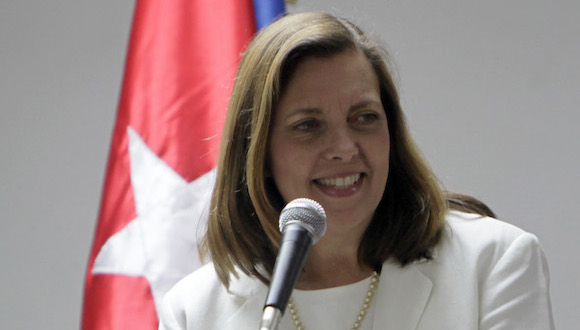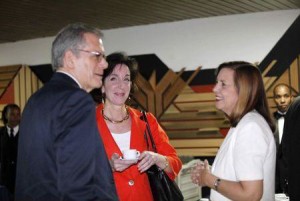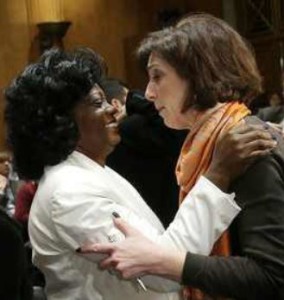
Vidal: Cuba’s sovereignty is not negotiable
Excerpts from interview with Josefina Vidal Ferreiro, Cuba’s chief delegate to the diplomatic talks between Cuba and the United States, broadcast over Cuban television on Feb. 2, 2015. Translation by Progreso Weekly; the translator’s clarifications appear [in brackets.]
—
[On illegal emigration:] We have tried for years, in our rounds of migratory talks with the U.S. Government, to emphasize the opinion that it is necessary to normalize the migratory flow between the two countries because it is not in the interest of Cuba or the United States to have an irregular migration flow, an illegal flow by sea, and also an irregular entry into U.S. territory, from third countries, of Cubans who leave the country legally.
This occurs due to a combination of two factors, and that’s why we say that this is the principal stimulus to illegal immigration and the traffic of persons from Cuba, and those two factors are the Cuban Adjustment Act and the “dry-foot-wet-foot” policy. […]

[The “dry-foot-wet-foot” policy] stimulates illegal immigration, but also encourages the traffic in emigrants and also endangers the lives of people at sea or exposes them to the activities of criminal groups that engage in the trafficking of emigrants.
In other words, it generates a series of additional problems. More recently, it has produced phenomena associated with migratory documents fraud, because today it is valuable to some nationalities to obtain some Cuban document in view of the exclusive and preferential treatment given [by the U.S.] to Cuban citizens.
In sum, this is the main stimulus to illegal emigration. We have repeatedly told the United States that it is imperative to broach it and focus on it, with a view to normalizing the migratory flows between our countries and avoid exposing the lives of people to dangerous situations in their efforts to reach that country.
Q.: Could we say then that it is impossible to have normal migratory relations with the United States so long as the Cuban Adjustment Act is in place?
A.: Of course we can say that. The Cuban Adjustment Act and the “dry-foot-wet-foot” policy are instruments that apply exclusively to Cuba. There exist no similar laws for other countries, otherwise we would see an uncontrolled, massive arrival of emigrants from all over the world. […]
Q.: There is a perception […] that Cuba has to do things to please the interests of the United States, so as to have the possibility of establishing diplomatic relations with them. Is this so? […]
A.: Relations between Cuba and the United States have been historically asymmetrical. Therefore, the approach of what in diplomacy is called quid-pro-quo — I give you something if you give me something — cannot be automatically applied.
You must take into account the fact that there’s a lot more things to dismantle on the part of the United States than on the part of Cuba, because in Cuba we don’t have sanctions against U.S. businesses or citizens.

Nor do we have occupied territory in the United States that we could trade for the occupied territory at the U.S. naval base in Guantánamo.
We don’t have programs financed from Cuba aimed at influencing the domestic situation in the U.S. or to promote changes in the internal order of the U.S.
We don’t have especially designed, illegal radio and television broadcasts from Cuba to the U.S. It’s all the opposite. In sum, there’s a greater set of policies and measures to be changed by the U.S. than by Cuba.
Of course, in every process of diplomatic negotiation, on some issues, it is possible to find points where we can say “well, I’d be willing to give in on this, and I’d be willing to give in on that, even though the issues are asymmetrical, with a view to move closer to the solution of many problems.”
What happens is that confusion arises and the international press feeds the confusion, in the sense that some people think or aspire or pretend that, as part of the negotiation, Cuba might put on the table issues that are entirely related to Cuba’s internal order and are issues of Cuban sovereignty.
That is not going to happen. We have reiterated, even in interviews with the U.S. press, that the issues of an internal nature in Cuba are not negotiable, just as they are not negotiable for any other country. […] Those issues are the sole and exclusive domain of the Cuban people, who, in a sovereign referendum, decided the course of this country and it will be up to the people of Cuba to decide it always.
Therefore, during this process of negotiation, while solving pending problems, we shall never put on the table issues of a domestic nature or issues directed at promoting changes in our internal order. I believe that it’s important that this be understood clearly.
That is why, at a press conference last week, I said that no one should expect that, in order to improve relations with the U.S. or advance in the long and complex process of normalization of relations, Cuba will negotiate issues of internal order in exchange for a U.S. policy that they themselves have acknowledged to be failed.
And we’re not going to negotiate issues of a domestic nature, of Cuban sovereignty, for a lifting of the blockade. […]
Q.: Has U.S. foreign policy changed its objectives in Cuba?
A.: I cannot say that the objectives have changed. […] I do not believe that the U.S. policy objectives toward Cuba have disappeared. In fact, Mrs. Roberta Jacobson, who visited us last week at the head of the U.S. delegation, said so herself.
The United States has not altered its strategic objectives toward Cuba. What has changed are the ways, the tactics. But, well, we are ready to go into that phase of confrontation of a new kind.
[On reciprocal restrictions:] At this time, the U.S. Government has stated that, if embassies are opened, freedom of movement is important. We have told them that we’re willing to discuss this, but it is very important that the behavior of U.S. diplomats in Havana changes.
Specifically, we’re referring to changes in the behavior of those diplomats, in the sense that they encourage, organize, train, supply, and finance elements inside our country who act against the interests of our State, against the interests of the Cuban government and people. […]
We emphasize this strongly because our diplomats in Washington behave impeccably and would never take any kind of action that could be interpreted by the U.S. Government as an intromission in their internal affairs. […] Total freedom of movement, an issue that the U.S. side is raising, is linked to a change in the behavior of its diplomatic mission and its functionaries here in Havana.
[On the outlook for the negotiations:] I believe that we should be neither pessimistic nor optimistic. This is a process and every process has stages, arduous periods of negotiation. There are issues to solve that are very complicated, such as a lifting of the blockade, and the solution to the economic difficulties that have afflicted us will not be found until the blockade is totally terminated.
Q.: Are you optimistic or pessimistic?
A.: I would say that I’m at a midway point. I can’t say that I’m totally optimistic because there are things that are outside my control. The Cuban side cannot control everything. There are two countries, and on the U.S. side there’s not only one government but also a Congress, a society, a political context. Therefore, not everything is under our control.
But I can’t say that I’m pessimistic, either, otherwise we wouldn’t have reached the point at which we find ourselves. But I think that we’re being quite realistic in our approach and our appreciation of circumstances, to try to advance as far as possible in the solution to our problems and, at the same time, to try to take best advantage of the opportunities that may rise before us.
[To read the entire interview, in Spanish, click here.]
[To watch the interview on YouTube, click here.]
[Photo atop of Josefina Vidal from Cubadebate.]

